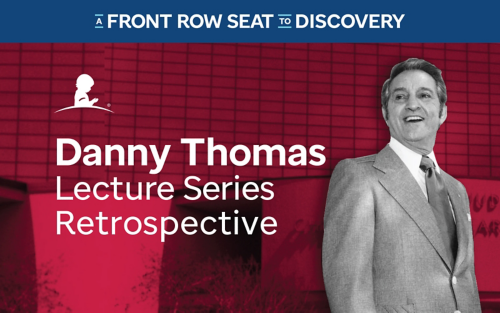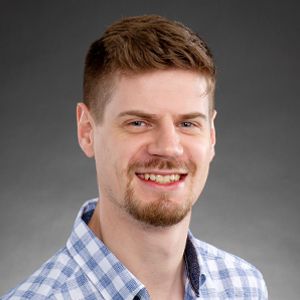St. Jude Family of Websites
Explore our cutting edge research, world-class patient care, career opportunities and more.
St. Jude Children's Research Hospital Home

- Fundraising
St. Jude Family of Websites
Explore our cutting edge research, world-class patient care, career opportunities and more.
St. Jude Children's Research Hospital Home

- Fundraising
Echoes of Excellence: The speakers who shaped the Danny Thomas Lecture Series

The journey of the Danny Thomas Lecture Series is paved with the stories of its speakers, and it continues to be added to each week.
Since St. Jude Children’s Research Hospital was founded in 1962, there has always been, in one form or another, a Friday lecture series. The series welcomed researchers and clinicians from St. Jude and institutions around the world to share insights, breakthroughs and innovations that pushed the boundaries of science and medicine, intending to reduce childhood mortality. Echoing the inclusive values flowing throughout St. Jude, the lecture series encourages all hospital members to join, learn and experience the latest scientific milestones that will steer future clinical advancements.
The lecture officially donned the name Danny Thomas Lecture Series (DTLS) in the early 2000s, honoring the hospital’s founder. Since then, it has become a testament to the innovation and collaboration that has made St. Jude a hub in the global scientific community. Reflecting on the list of speakers is akin to journeying through the most impactful scientific milestones in the last 20+ years.
While it is easy to look back and attest to, for example, the number of Nobel prizes awarded to DTLS speakers (eight), most speakers had not received this honor before their talk. Only two already-awarded Nobel laureates spoke at the DTLS: Peter Agre, MD, in September 2008, who was awarded the honor in Chemistry for his work on aquaporins in 2003, and Harold Varmus, MD, the Vincent Kidd Memorial Lecture speaker in 2011, who won the Prize in Physiology or Medicine in 1989 for showing how cancer genes can arise from normal genes. This is a testament to how the DTLS stays on the cutting edge of science. The series provides a platform to communicate the most recent and groundbreaking advancements — in many cases before their scientific value has been fully realized.
Such was the case when Thomas Steitz, PhD, was invited to St. Jude in 2005 to speak on motion in macromolecular machines. Four years later, he shared the Nobel Prize in Chemistry for studies on the structure and function of the ribosome. Similarly, the 2018 Nobel laureate in Physiology or Medicine, James Allison, PhD, noted for the discovery of cancer therapy through immune regulation, spoke at the DTLS in 2009 on that very topic. Randy Schekman, PhD, awarded the prize in Physiology or Medicine in 2013 was the DTLS speaker not two months earlier, when he gave a presentation on membrane assembly.
In 2011, Sir Peter Ratcliffe, FRS, FMedSci, spoke on how cells sense oxygen, educating the St. Jude community on a phenomenon that would earn him the 2019 prize in Physiology or Medicine. Most recently, in April 2022, Drew Weissman, MD, PhD, spoke at the DTLS on the use of nucleoside base modifications in therapeutics. These were vital in developing the mRNA vaccines used to combat SARS-CoV2, earning Weissman the 2023 Nobel Prize in Physiology or Medicine.
Emmanuelle Charpentier, PhD, who shared the 2020 Nobel prize in chemistry for her work on CRISPR/Cas9 genome editing, holds two ties to St. Jude. First, her 2014 talk at the DTLS brought the potential of genome engineering to the St. Jude community. Second, she was invited to speak by her former postdoctoral advisor, Elaine Tuomanen, MD, St. Jude Department of Host-Microbe Interactions, to share her colleague and friend’s discoveries with St. Jude.
The topics discussed at the DTLS trace the journey of the scientific community toward advancing the treatment of childhood cancer and other debilitating diseases step by step. Janet Rossant, CC, PhD, FRS, FRSC, a world-renowned developmental biologist and 2015 Canada Gairdner Wightman Award winner, presented her work in embryology in 2012. Fredrick Alt, PhD, has been no stranger to St. Jude, presenting updates on his groundbreaking work in genome stability in 2005, 2007 and 2017, earning the Lewis S. Rosenstiel Award in 2014 and, most recently, the Paul Ehrlich and Ludwig Darmstaedter Prize in 2023. Mina Bissell, PhD, a pioneer in breast cancer research, spoke in 2010 on the tumor microenvironment. Her work in the field saw her awarded the Canada Gairdner International Award in 2020 for a lifetime of stellar contributions.
The annual Vincent Kidd Memorial Lecture, named for Vincent Kidd, PhD, a much-loved faculty member in the Department of Tumor Cell Biology who passed away in 2004, has brought numerous field leaders to St. Jude. Sir Philip Cohen, FRS, FRSE, FAA, FFMedSci, was the lecture’s speaker in 2011, presenting on protein kinase inhibitors. His contributions to the field saw him awarded the Albert Einstein World Award of Science in 2014. Robert Langer, FREng, gave the lecture in 2020 when he presented on biomaterials in drug delivery, the discipline which has seen him become one of the most highly recognized and highly cited researchers to date, and currently head of the largest biomedical engineering lab in the world.
In 2008, St. Jude welcomed Phillipa Marrack, PhD, to the DTLS to speak on T-cell receptors, the discovery and isolation of which she played a vital role, one of many accomplishments of a highly decorated career. Marrack was inducted into the National Women’s Hall of Fame in 2015. In 2011, Pascale Cossart, PhD, presented her work on bacterial immunological evasion, research which had seen her receive the inaugural L’Oréal-UNESCO For Women in Science Award in 1998, along with many other accolades in an illustrious career.
While it is often difficult to acknowledge the importance of any individual talk when, for many, our days revolve around seminars and lectures, the DTLS takes much of the guesswork out of the equation. Through legacy, careful planning and respect earned over decades, when the clock strikes noon on Friday, being present in the Marlo Thomas Auditorium is positioning oneself to be a part of this history and to learn about the latest advancements that will shape the hospital, and broader scientific community, for years to come.






